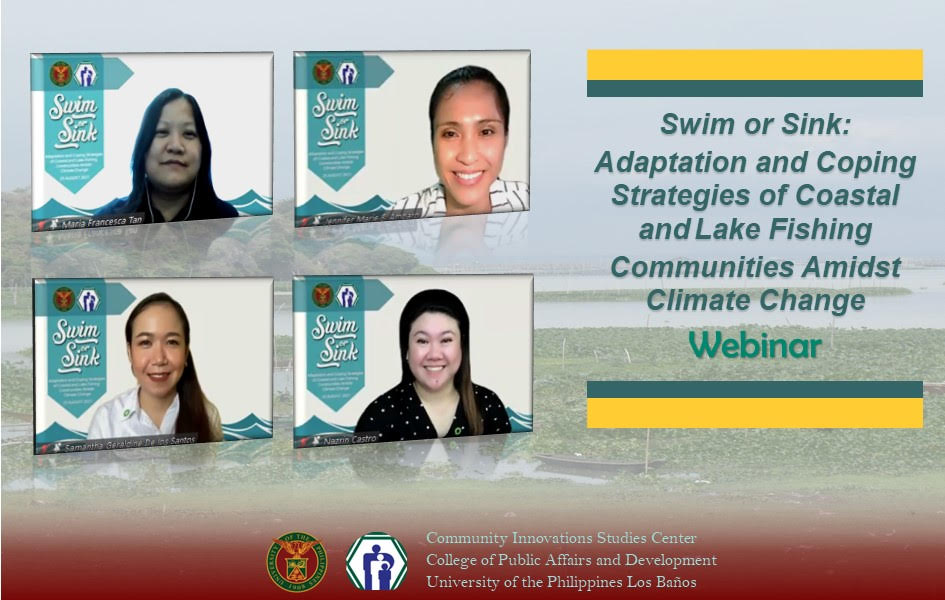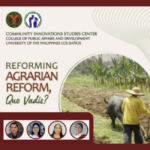The Community Innovations Studies Center (CISC) of the College of Public Affairs and Development (CPAf) launched its first webinar on the Center’s research outputs last Aug. 25 via Zoom and Facebook Live. The event highlighted the adaptation of coastal and lake fishing communities amidst climate change.
“The goal of this webinar is not just to listen to the experiences of the vulnerable fisherfolks but to also learn about their coping and adaptation strategies. [However,] I hope that this will not end here,” CPAf Dean Rowena DT. Baconguis said in her opening remarks. She challenged the participants to take actions to improve the livelihood of fishermen and strengthen their communities.
One of the featured projects in this webinar was the research on developing the resilience of fishing communities. Maria Francesca O. Tan, one of the study leaders, delivered the presentation titled “Adaptive Strategies and Coping Mechanisms of Lakeshore Communities on the Impacts of Climate-Related Disturbances in the Major Lakes of Luzon.”
She highlighted the gender-based strategies of fishing households and the institutional and organizational support provided by different sectors including government, private, and non-government organizations.
“We came up with this project because lakes are significant to their surrounding communities. In the last 30 years, the increase in frequency and intensity of typhoons and other hydro hazards threatened the agricultural sector…[but] only limited studies exist to determine the extent of impacts on vulnerable communities [like fishing communities],” Tan explained.
Sharing her insights on the presentation was Dr. Jennifer Marie S. Amparo, assistant professor of the UPLB College of Human Ecology.
“The fishery sector being a nature-based industry is already a complex livelihood, and then coupled that with climate-induced disturbances, that becomes a double whammy for them,” Dr. Amparo said.
According to Dr. Amparo, changes resulting from coping and adaptation strategies of the fishery sector impact the food system activities (i.e., production, distribution, consumption) and food systems outcomes (i.e., food availability, access, and utilization). She recommended gender-transformative approaches to fisheries development and disaster risk reduction management to have resilient and sustainable nature-based livelihoods and communities.
Another project featured in the webinar was the study conducted by Samantha Geraldine G. De los Santos titled “Adaptation through Limited Knowledge: Sarangani Fisherfolk’s Strategies to Address the Changing Climate.” In her presentation, De los Santos emphasized the need to educate the public about climate change and its impacts on fishing communities. She emphasized the need to recognize the fisherfolks’ knowledge, address their low awareness and lack of adaptation on climate change issues through community educational campaigns, and address the rise of sea level through various programs and policies. Complementing their knowledge and practices with appropriate technologies and information will facilitate their capabilities and strategies to adapt to the varying climate.
Nazrin Camille D. Castro, manager of The Climate Reality Project Philippines, served as the discussant of De los Santos’ paper. “The agriculture and fishery sector will continue to face the risks due to climate change. Their livelihoods and incomes will dwindle with the continuously changing climate, and we cannot afford to be passive in addressing this issue,” she noted.
To counter communities’ lack of awareness on climate change, Castro recommended the establishment of climate field schools. She also proposed the establishment of post-harvest equipment (e.g., cold storage facilities for fishers) and the provision of climate risk insurance policies for vulnerable communities. “Locally-led adaptations can unlock, support, and leverage the enormous potential and the creativity of individuals and communities to develop solutions based on their experiences,” she said.
CISC is one of the research centers of CPAf. Its research projects focus on integrative community development studies, agrarian studies, and rural advisory services.






